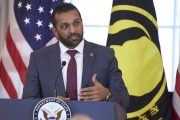
While President Trump’s Attorney General Jeff Sessions (shown) was in Richmond, Virginia, last week addressing federal, state, and local law-enforcement officials, he said he planned to promote a 20-year-old “solution” to gun violence: Project Exile: “We need to enforce our gun laws; we will put bad people behind bars,” he stated, adding that Project Exile is “a very discreet, effective policy” and that he will “promote it nationwide.”
If Project Exile worked so well 20 years ago in Richmond, why did the city back away from it in 2006? And why haven’t scores of other cities adopted it since then and praised its performance? Additionally, why have the NRA and the Brady Campaign endorsed it while groups such as Gun Owners of America (GOA) and Jews for the Preservation of Firearms Ownership (JPFO) have come out against it?
When it was initially implemented in 1997 in Richmond, the city had seen its murder rate skyrocket. In 1996, there were 112 murders, which put it in the top five cities in the country for its murder rate per thousand population. The next year Richmond experienced 140 murders.
The guiding principle of the project was to remove from the streets those were who were most likely to commit gun violence: those possessing both a firearm and a criminal record. This included convicted felons caught with a gun as well as those who committed crimes using a gun. The idea behind it was that an individual caught would be tried in federal court rather than state or local court, as the federal penalties were much tougher: five years in jail minimum with no allowance for bail or early parole. Further, upon conviction, the individual was moved to a federal prison to serve his sentence, often many miles away from Richmond — hence the name “Exile.”
The National Rifle Association has been a supporter of the program since its inception, as has the Brady Campaign, as both groups saw it, on paper at least, as a way to reduce crime that appeared to be getting out of control. NRA Executive Vice President Wayne LaPierre stated, “By prosecuting [criminals violating gun laws it] prevent[s] the drug dealer, the gang member and the felon from committing the next crime … [you] leave the good people alone and lock up the bad people and dramatically cut crime.”
Initially, Project Exile looked as though it might work. In 1998, the first full year after its implementation in Richmond, murders dropped from 140 (1997) to 94. By 2001 murders had dropped to 69, an astonishing reduction of 50 percent.
But then something happened over which analysts and statisticians have puzzled ever since: In 2002 murders jumped to 83; in 2003 they clocked in at 94; the next year the rate was 95, followed by a jump in 2005 to 132. That’s when the city backed away from the project, and then the murder rate dropped to 56 in 2007. Critics of the project said the Project Exile was too harsh — that it was incarcerating individuals caught for minor crimes, and that it removed local accountability.
Two major research projects were undertaken, with equally unsatisfying conclusions. One said the decline was directly due to Project Exile, while the other said it was part of a national decline in the number of murders that were taking place anyway.
Angel Shamaya, then the executive director of KeepAndBearArms.com, joined with Aaron Zelman, the executive director for JPFO and Larry Pratt, executive director of GOA, to condemn Project Exile — not because it didn’t work, but because it violated the Constitution. The petition they created said:
The signers of this statement support any reasonable law-enforcement program that removes violent repeat-offender felons from our cities and neighborhoods, but only if the laws utilized to convict and to punish such felons are constitutional.
We condemn any program that involves enforcing unconstitutional “laws,” even if such “laws” are enforced only against violent criminals. Unconstitutional “laws” are illegal, harmful to public safety, tyrannical, and are inevitably enforced against ordinary, non-criminal citizens….
Most — if not all — of these laws are unconstitutional violations of the Second Amendment.
Missing from the petition is another danger: the “coordination” of efforts between the federal government’s Department of Justice and its Bureau of Alcohol, Tobacco, Firearms and Explosives (ATF) and state and local law enforcement. It’s that “coordination” that will likely lead to federal takeover and control of state and local law enforcement, just as The John Birch Society has warned against for decades with its “Support Your Local Police” program.
Careful observers were concerned when President Trump tweeted about gun violence in Chicago: “I will send in what I have to send in … but you can’t have those killings going on in Chicago. Chicago is like a war zone.”
So is Richmond. Its murder rate jumped to 124 last year, reinstating it as one of the most dangerous cities in the country. But that scarcely provides an excuse for federal officials to come in under the guise of a flawed program such as Project Exile and “coordinate” efforts to put away felons. America’s Founders knew the dangers of a federal police force, and that’s why the Second, Ninth, and 10th Amendments were added to keep the national government in its place.
Photo: AP Images
An Ivy League graduate and former investment advisor, Bob is a regular contributor to The New American magazine and blogs frequently at LightFromTheRight.com, primarily on economics and politics. He can be reached at [email protected].
Related article:
AG Sessions’ Strong Support of Local Police Misses Key Point





